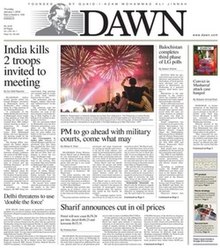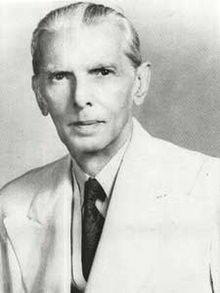Dawn (newspaper)
 | |
 Front page, 1 January 2015 | |
| Type | Daily newspaper |
|---|---|
| Format | Broadsheet |
| Owner(s) | Dawn Media Group |
| Founder(s) | Muhammad Ali Jinnah[1] |
| Editor | Zaffar Abbas |
| Founded | 26 October 1941 |
| Language | English |
| Headquarters | Karachi, Sindh, Pakistan |
| ISSN | 1563-9444 |
| Website | dawn.com |
Dawn is a Pakistani English-language newspaper that was launched in British India by Muhammad Ali Jinnah in 1941. It is the largest English newspaper in Pakistan, and is widely considered the country's newspaper of record.[2][3][4] Dawn is the flagship publication of the Dawn Media Group, which also owns local radio station CityFM89 as well as the marketing and media magazine Aurora.[5]
Muhammad Ali Jinnah, Pakistan's founding father, launched the newspaper in Delhi on 26 October 1941, with the goal of establishing it as a mouthpiece for the All-India Muslim League. The first issue was printed at Latifi Press on 12 October 1942.[6] Based in Karachi, it also maintains offices in Lahore, Peshawar, Quetta and the capital city of Islamabad, in addition to having correspondents abroad.[7] As of 2010[update], it has a weekday circulation of over 109,000.[8] The newspaper's current chief editor is Zaffar Abbas.
History
[edit]
Dawn began as a weekly publication, based in New Delhi.[1] Under the instruction of Jinnah, it became the official organ of the All India Muslim League in Delhi, and the sole voice of the Muslims League in the English language, reflecting and espousing the cause of Pakistan's creation. Jinnah summed up the paper's purpose in these words:
"The Dawn will mirror faithfully the views of Hindustan's Muslims and the All Hindustan Muslim League in all its activities: economic, educational and social and more particularly political, throughout the country fearlessly and independently and while its policy will be, no doubt, mainly to advocate and champion the cause of the Muslims and the policy and programme of the All Hindustan Muslim League, it will not neglect the cause and welfare of the peoples of this sub-continent generally".[9]
Dawn became a daily newspaper in October 1944 under the leadership of its editor, Pothan Joseph, who later resigned in 1944 to take up the position of the government's principal information officer in part because of differences with Jinnah over the Pakistan Movement. He was succeeded by Altaf Husain who galvanized the Muslims of India for independence by his editorials, which earned him the ire of the Congress Party and of Lord Mountbatten, the last Viceroy and Governor-General of the British Raj both of whom wanted a united India.[10]
In 1947, due to the Partition of India, senior Dawn staff led by Altaf Husain moved to Karachi, which led to that city becoming the head office of the newspaper.[10]
In 1950, for a brief period, the owners discontinued Dawn over ownership issues and restarted it as Herald.[11][10]
Features
[edit]
Dawn regularly carries syndicated articles from western newspapers such as The Independent, The Guardian, the Los Angeles Times and The Washington Post.[citation needed]
On Sundays, the weekend advertiser carries three sections namely "Ad Buzz", "Career", and "Real Estate".[12]
Publication of the US diplomatic cables
[edit]On 19 May 2011, Dawn Media Group signed a memorandum of understanding with Julian Assange, founder of WikiLeaks, for the exclusive first use in Pakistan of all the secret US diplomatic cables related to political and other developments in the country.[13]
An announcement printed in the newspaper and posted on the website read:
The Dawn Media Group and Julian Assange, Chief Executive of Sunshine Press Productions, the publishing arm of WikiLeaks, have signed a Memorandum of Understanding for the exclusive first use in Pakistan of all the secret US diplomatic cables related to political and other developments in the country.[13]
Resignation of Pervaiz Rashid
[edit]In 2016, a story, "Act against militants or face international isolation, civilians tell military" by Cyril Almeida, assistant editor and columnist for Dawn, triggered the resignation of Information Minister Pervaiz Rashid, after a preliminary investigation established a "lapse" on his part vis-à-vis the publication of the "planted" story.[14]
Editorial stance
[edit]Dawn's editorial stance has varied over time, influenced by its editors and the prevailing political context.[11] Altaf Husain, the second editor of Dawn, was known for his confrontational editorials that often challenged governmental policies, maintaining the newspaper's editorial independence despite financial pressures from advertising boycotts.[11] He staunchly supported the Pakistan Muslim League and was critical of governments not aligned with it.[11] Husain's foreign policy views favored a military alliance with the United States, shifting only when geopolitical circumstances led him to support ties with China, regardless of its communist regime.[11]
After Husain's tenure, the newspaper experienced a rapid succession of editors, each introducing their own unique editorial policies.[11] Jamil Ansari, for example, closely aligned with the Ayub Khan administration, exercising caution in editorial decisions to avoid offending the government.[11] In contrast, Yusuf Haroon's brief editorship was marked by a conservative approach to content and layout, aiming to preserve the newspaper's independence from state influence.[11] Altaf Gauhar, successor of Yusuf Haroon, notably transitioned from being an architect of restrictive press laws to advocating for free speech, critiquing government policies through his editorials.[11] His successor, Mazhar Ali Khan, brought a progressive stance to the newspaper, focusing on professional journalism and reasoned critique of government policies.[11]
Ahmad Ali Khan, the longest serving editor of Dawn, stabilized the newspaper's editorial direction, blending a progressive outlook with cautious navigation of the restrictive political environment under Muhammad Zia-ul-Haq.[11] Despite the constraints, the newspaper managed to subtly critique the regime's policies, especially those that contradicted the principles of democracy and civil liberties.[11]
The period following Khan's tenure saw editors such as Saleem Asmi, Tahir Mirza, and Abbas Nasir each contributing to Dawn's development in their own unique ways.[11] Asmi expanded the newspaper's coverage to include the arts and launched new editions.[11] Nasir adapted the newspaper to the digital age, enhancing its online presence and emphasizing the need for investigative journalism and a diverse range of op-ed contributors.[11]
Editors
[edit]- Pothan Joseph (1944)[10]
- Altaf Husain (1944–1965)[10]
- Jamil Ansari (1965–1966)[11]
- Yusuf Haroon (1966)[15][11]
- Altaf Gauhar (1969–1973)[10][16]
- Mazhar Ali Khan (1973)[11]
- Ahmad Ali Khan (1973–2000)[17]
- Saleem Asmi (2000–2003)[11]
- Tahir Mirza (2003–2006)[18]
- Abbas Nasir (2006–2010)[19]
- Zaffar Abbas (2010–present)[11]
See also
[edit]References
[edit]- ^ a b Long, Roger D. (27 August 2017). "Dawn Delhi I: Genesis of a Newspaper". Dawn. Retrieved 27 August 2017.
- ^ "The assault on Pakistan media ahead of vote". 4 July 2018 – via BBC News.
- ^ "Following attacks on offices, Dawn editor alleges 'orchestrated campaign' against newspaper". Arab News PK. 7 December 2019.
- ^ "Dawn joins Asia News Network". The Daily Star. 29 November 2011. Retrieved 20 February 2018.
- ^ "The Haroon-Saigol Family". Retrieved 15 November 2024.
- ^ Jinnah, Mahomed Ali (1976). Plain Mr. Jinnah. Vol. 1. Royal Book Company (on GoogleBooks website). p. 236. Retrieved 29 July 2017.
- ^ "Our International Business Representatives". Dawn Media Group. Archived from the original on 30 June 2006. Retrieved 29 July 2017.
- ^ "The Inside Pages: An Analysis of the Pakistani Press" (PDF). Center for Strategic and International Studies. Archived from the original (PDF) on 1 July 2015. Retrieved 29 July 2017.
- ^ Aqeel-uz-zafar Khan. "Jinnah and the Muslim press". JANG Newspaper Group. Archived from the original on 10 January 2009. Retrieved 29 July 2017.
- ^ a b c d e f "Dawn | Media Ownership Monitor". Pakistan.mom-rsf.org. Retrieved 6 August 2022.
- ^ a b c d e f g h i j k l m n o p q r s t "Editors and their policies". 2 October 2017.
- ^ "Advertise DAWN". DAWN.com. Retrieved 29 July 2017.
- ^ a b Announcement, Memorandum of Understanding between Dawn Media Group and Sunshine Press Productions, Dawn (newspaper), Published 19 May 2011, Retrieved 29 July 2017
- ^ "Govt forms inquiry committee to probe 'Dawn leaks'". The Express Tribune. 7 November 2016. Retrieved 29 July 2017.
- ^ "Obituary: Former governor of West Pakistan no more". 17 February 2011.
- ^ "Altaf Gauhar passes away -".
- ^ "Ahmad Ali Khan passes away". 14 March 2007.
- ^ "Tahir Mirza passes away". 30 May 2007.
- ^ "Dawn Editor". 16 May 2006.



